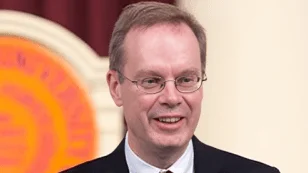Chancellor Kent Syverud | Syracuse University
Chancellor Kent Syverud | Syracuse University
For millions worldwide, land degradation due to climate change, deforestation, overgrazing, and unsustainable farming has impacted human health and the environment. Desertification, where fertile land becomes desert through natural and human factors, can lead to food and water scarcity, biodiversity loss, and forced migration. In December 2024, the United Nations held a conference in Saudi Arabia with environmental experts and policymakers discussing strategies to combat desertification.
Mariaelena Huambachano, an Indigenous scholar and assistant professor at the College of Arts and Sciences (A&S), delivered three talks during the 11-day United Nations Convention to Combat Desertification (UNCCD). She is part of A&S’ Center for Global Indigenous Cultures and Environmental Justice. Her courses include Food Fights and Treaty Rights, Indigenous Food Cosmologies, and Reclaiming Indigenous Intellectual Sovereignty.
Huambachano spoke during the UNCCD’s High-Level Interactive Dialogue on Science, Technology, and Innovation Day. She is known internationally for her work on Indigenous food sovereignty. In August 2024, she published “Recovering Our Ancestral Foodways: Indigenous Traditions as a Recipe for Living Well” (University of California Press), based on ten years of fieldwork with the Quechua of Peru and Māori of New Zealand. The book explores well-being philosophies, food sovereignty, traditional ecological knowledge, and sustainable food systems.
At the conference, Huambachano emphasized recognizing Indigenous knowledge in climate policy development. She noted how Indigenous values support healthy land management, biodiversity protection, and climate resilience.
“I provided examples drawn from my years of work on the value of integrating Indigenous science in improving sustainable food systems,” Huambachano says. “We have been informed that the policy recommendation we presented has been endorsed by the host country, Saudi Arabia. I am particularly happy to see that Indigenous science, innovation and practices are being recognized internationally.”
This marks Huambachano’s fifth appointment to a United Nations High-Level Panel.






 Alerts Sign-up
Alerts Sign-up